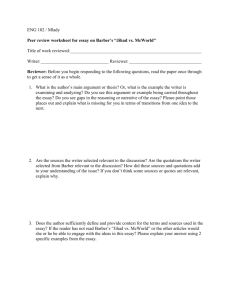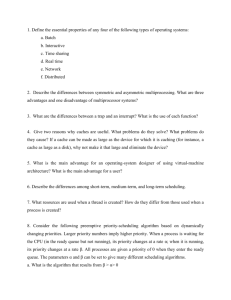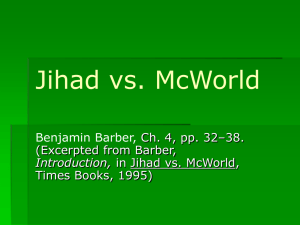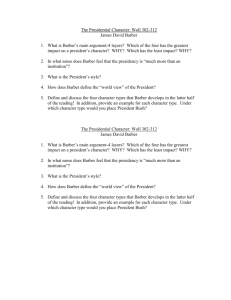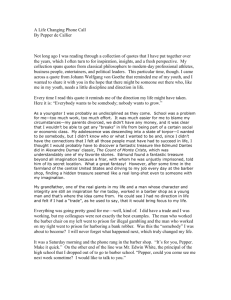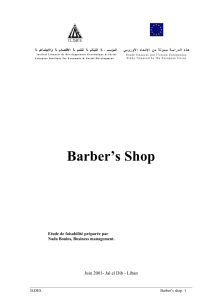JIHAD VS. MCWORLD
advertisement
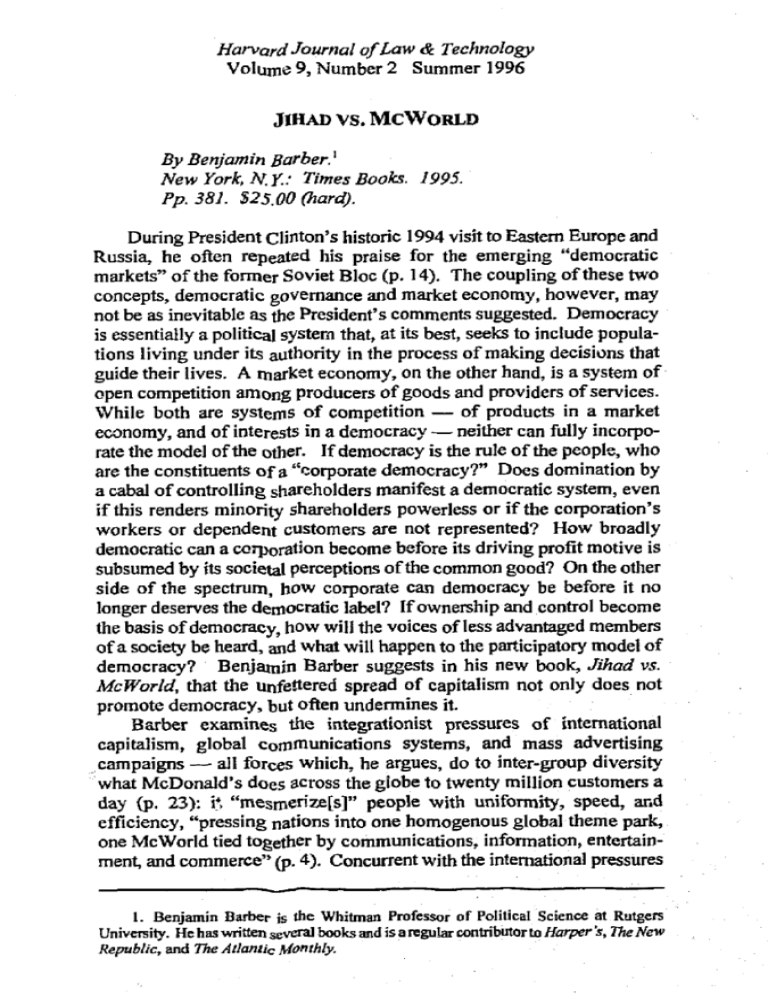
Harvard Journal of Law & Technology Volume 9, Number 2 Summer 1996 JIHAD VS. MCWORLD By Benjamin Barber. New York, N.y.: Times Books. 1995. Pp. 381. $25.00 (hard). During President Clinton's historic 1994 visit to Eastern Europe and Russia, he often repeated his praise for the emerging "democratic markets" of the former Soviet Bloc (p. 14). The coupling of these two concepts, democratic governance and market economy, however, may not be as inevitable as the President's comments suggested. Democracy is essentially a political system that, at its best, seeks to include populations living under its authority in the process of making decisions that guide their lives. A market economy, on the other hand, is a system of open competition among producers of goods and providers of services. While both are systems of competition - - of products in a market economy, and of interestS in a democracy - - neither can fully incorporate the model of the other. If democracy is the rule of the people, who are the constituents of a "corporate democracy?" Does domination by a cabal of controlling shareholders manifest a democratic system, even if this renders minority shareholders powerless or if the corporation's workers or dependent customers are not represented? How broadly democratic can a corporation become before its driving profit motive is subsumed by its societal perceptions of the common good? On the other side of the spectrum, how corporate can democracy be before it no longer deserves the democratic label? If ownership and control become the basis of democracy, how will the voices of less advantaged members of a society be heard, and what will happen to the participatory model of democracy? Benjamin Barber suggests in his new book, dihad vs. McWorld, that the unfe~ered spread of capitalism not only does not promote democracy, but often undermines it. Barber examines the integrationist pressures of international capitalism, global communications systems, and mass advertising campaigns - - all forces which, he argues, do to inter-group diversity what McDonald's does across the globe to twenty million customers a day (p. 23): it "mesmerize[s]" people with uniformity, speed, and efficiency, "pressing nations into one homogenous global theme park, one McWorld tied together by communications, information, entertainment, and commerce" (p. 4). Concurrent with the international pressures I. Benjamin Barber is the Whitman Professor of Political Science at Rutgers University. He has written several books and is a regular contributor to Harper's, TheNew Republic, and The Atlantic Monthly. 566 Harvard Journal of Law & Technology [Vol. 9 of McWorld, however, are the reactionary and divisive efforts by groups to separate themselves from the larger communities to which they had previously been connected, to retribalize previously integrated societies, and to balkanize preexisting nation-states. In using the term "Jihad" to characterize this trend, Barber refers not only to the religious factions with which the word is most commonly associated, but also to ethnic groups, such as those in conflict in Somalia and the former Yugoslavia, and even to movements with no aspirations to independent governance, such as the militias in Michigan. McWorld and Jihad represent to Barber two colossal forces battling to define the individual and her relation to a changing world. McWorld impels societies to open to global perspectives and institutions; Jihad drives groups to revert to the most elemental particular. Barber casts the MeWorld image of Disneyland against the Jihad image of Babel (p. 4) as symbols of this dichotomy. Other combatants on this symbolic battleground include Coca-Cola and the Ayatollah (p. 292), Barbie and babushka (p. 254), and Shaquille O'Neal and Sheik Omar Abdul Rahman (p. 83). Barber sees the greatest danger as coming from neither of these extremes of Jihad and McWorld, but more from the relation between the two. Jihad and McWorld, he argues, are mutually reinforcing and interacting constantly. The image the author suggests to capture the world of the late 20th century is therefore neither the machete-wielding Hutu nor the Kentucky Fried Chicken restaurant in Xian, China, but instead the Serb sniper tapping his Reeboks to Madonna on his Sony Walkman as he picks off the Muslim inhabitants of Sarajevo. This argument seems to work best when describing McWorld's uncanny ability to unleash Jihad. In a world of mass communication, multi-national corporations, and international capital markets, where money, expertise, and centers of operation can be shifted across the globe at a moment's notice, governments are playing an increasingly smaller role. International influences like market swings, capital flight, and changing global and regional power configurations impinge upon state sovereignty and unleash dormant forces of Jihad. Consider Yugoslavia and many of the former Soviet republics, where economic crisis fueled by internatior~al competition in part led to the downfall of previously stable political systems. Barber's case for Jihad's ability to influence McWorld, however, is slightly more strained. Surely, the angry power of Jihad can strike back at the very symbols of McWorld, as the Pan Am Flight 103, World Trade Center, and Oklahoma City bombings attest, but it is difficult to argue that such Jihad-inspired tragedies give McWorld even the slightest pause. Barber argues that, whatever their connection with each other, both Jihad arid McWorld are at root inimical to democracy because both No. 2] Jihad vs. M c W o r l d 567 undermine traditional notions of citizenship, Jihad through the devolution of the state into micro-communities and McWorld by devaluing state boundaries and fostering an extra-national uniformity of consumer behavior. Without a constituency of citizens, without a deliberative civil society, and without shared conceptions of the common good, there can be no democracy (pp. 8, 219, 223, 277). Barber's democracy, therefore, resides in the community created by the state, which both Jihad and McWorld undermine. McWorid's pure capitalist markets erode state sovereignty because corporations demand and require both access to an increasing number of consumers and the ability to develop markets for their products. B~rber claims: "There is no activity more intrinsically global than trade, no ideology less interested in nations than capitalism, no challenge to frontiers more audacious than the market" (p. 23). Although nationstates can facilitate or interfere with this process, they are not essential to it. Consumers purchasing goods from corporations may benefit from living within a democratic system, but neither purchase nor sale requires any particular form of political organization. Barber asserts: "[C]apitalism does not need or entail democracy. And capitalism certainly does not need the nation-state that has been democracy's most promising host" (p. 15). Commercial slogans themselves proclaim the universality of consumer culture: "On planet Reebok there are no boundaries" (p. 24). The forces of Jihad are no more friendly to traditional state sovereignty, except perhaps in the most homogenous, small, and isolated of states. Once the concept of integration and cooperation between groups is jettisoned, it is impossible to determine the point at which the process of division will stop. If Quebec deserves independence from Canada, should not the Cree Indians similarly be entitled to independence from Quebec? Should one group of Crees deserve freedom from domination by another? As states become smaller and smaller, they look increasingly more like the tribal communities which pre-existed the nation-state. If, as Barber argues, the state is a body in which democracy resides and can flourish, then the decline of the nation-state as a result of Jihad and McWodd poses a direct threat to the vitality of democratic systems.2 Both Jihad and McWorld are also intolerant of the diversity intrinsic to the democratic process. Coca-Cola, in trying to win consumers in China, must convince the Chinese to put aside their tea. To cause 2. For different but complementary examinations of the decline of the nation~tate, compare JEAN-MArnEGUEHENNO,THE END OF THE NATIONSTATE( | 995) with WALTER WRISTON, TWILIGHT OF SOVEREIGNTY: HOW THE INFORMATION REVOLUTION 1S TRANSFORMINGOUR WORLD (I 992). .~" ~,- 568 Harvard Journal of Law & Technology [Vol. 9 Argentineans, Brazilians, Chileans, Japanese, Malaysians, and Mexicans to make Terminator 2 their top grossing film in 1991, and Austrians, Danes, Egyptians, French, Icelanders, Dutch, Poles, Spaniards, and Swiss to give the same honor to Dances with Wolves (p. 299), promoters must train local populations to value these films. Although some might argue that these American films are simply superior to, or inherently more appealing than, films produced elsewhere in the world, it also seems likely that foreign audiences are responding to what might be called the mass marketing of the American experience, or, in Barber's terms, to popular culture driven by "expansionist commerce" (p. 17). Barber argues that effective mass marketing has brought European moviegoers down to an American level of"infantilism" (p. 93). Mass marketing, in its broadest sense, attaches the cleanliness, the efficiency, and the media image of McDonald's to the frozen processed beef and fried potatoes actually being sold. According to Barber, this process is motivated and fueled by aggressive capitalism, which requires uniformity to maximize profits and to develop ever larger economies of scale, as well as by international institutions, including "intemational banks, trade associations, transnational lobbies like OPEC, world news services like CNN and the BBC, and multinational corporations" that lack distinctive national identities (p. 13). Barber notes that the international marketing budget for McDonald's is an astounding $1.4 billion a year (p. 128), significantly more than the national budgets of many of the countries in which it operates. He argues that not only does capitalism define our desires, but it also defines our common spaces; often with alarming results: Go into a Protestant church in a Swiss village, a mosque in Damascus, the cathedral at Reims, a Buddhist temple in Bangkok, and though in every case you are visiting a place of worship with a common aura of piety, you know from one pious site to the next you are in a distinctive culture. Then sit in a multiplex moviebox - - or, much the same thing, visit a spectator sports arena or a mall or a modem hotel or a fast-food establishment in any city around the world - - and try to figure out where you are. You are nowhere. You are everywhere. Inhabiting an abstraction. Lost in Cyberspace . . . . Where are you7 You are in McWorld (pp. 98-99). Although anyone who eats a Big Mac in Beijing or drinks Pepsi in Poznan cannot question the spread of Western mass consumer products, it is difficult to follow Barber all the way down the path he leads. For Barber, people become what they consume - - the Chinese worker No. 2] Jihad vs. McWorld 569 leaving McDonald's is somehow less Chinese than when he entered. One wonders, however, whether the case is really so strong. Tastes, of course, change, and greater cross-cultural access facilitates this process, but is this not merely a faster version of what has always happened when information passes from clan to clan, village to village, or civilization to civilization? Certainly, mass media and capitalist structures facilitate the often lopsided transfer of information from one culture to another, but this is hardly a new phenomenon. Without television or radio, India exported a culture that radically transformed customs and transitions in mainland Southeast Asia over the first millennium) While today one can see much of India in Thailand or Cambodia, how much of Thailand or Cambodia can be seen in India? Further, these internationalist forces which Barber cynically describes cannot perfectly be decoupled from other international influences that might be viewed in a more favorable light. The international contact which brings the cola wars to the far corners of the globe cannot be so easily and completely detached from the international contact which carries with it ideals of human rights and environmental protection. The radio and computer which can be tools of consumerization and repression can just as well serve as implements of education, development, and liberation, as seen in their use by activist networks resisting authoritarian regimes and in fostering educational links which promote scholarship and collaboration across the globe.4 By creating the partially justified bogeyman of McWorld, Barber seems to discount many of the benefits of greater international links. Barber's McWorld addresses differences by ironing them out and reaching towards a world united by the same tastes in food, clothes, entertainment, and economics. Jihad, however,-rejects diversity by eradicating tolerance: it "identifies the self by contrasting it with an alien 'other,' and makes politics an exercise in exclusion and resentment" (p. 222). It is not surprising, therefore, that an official of the Iranian Ministry of Culture and Islamic Guidance railed against the satellite dishes beaming down reruns of Dynasty, Donahue, and The Simpsons as being part of "an extensive plot to wipe out our religions and sacred values" (p. 207). Paradoxically, the community of Jihad requires both a firewall protecting it from the outside world and a discernible external enemy against which to focus its r a g e - - there can be no Jihad in utopia. Like McWorld, however, Barber's depiction of Jihad rings somewhat 3. See DAVIDP. CHANDLER,A HISTORYOFCAMBODIA1!-13 (1993). 4. See, e.g., Lin Neumann, The Resistance Network, WIRED,Jan. 1996, at 108o12; Russell Watson, When Words Are the Best Weapon: Use of lnformation Technolog7 by Revolutionary Groups, NEWSWEEK,Feb. 27, 1995, at 36; Daniel Lyons, Moderns: Technology Empowers Chinese Fightingfor Reform, PC WK.,.lune 19, 1989, at 71; Joel Brown, Going Online to Save the World, ONLINE,Jan.-Feb. 1995, at 46. 570 Harvard Journal of Law & Technology [Vol. 9 hollow upon reflection. While some groups, like the Iranian Mullahs and the Ku Klux Klan. are responding to the integrationist pressures of modernity with the missionary zeal of Jihad, can the same label be applied just as well to 'all groups claiming minority rights, including the East Timorese or Sri Lankan Tamils whose primary aim is to be left alone? Jihad is a loaded term and a deeper, more textured treatment of it might have answered such questions. Barber argues that both Jihad and McWorld challenge the integrity of individuals within societies in ways harmful to democratic processes. While democracy requires deliberative, flee-thinking citizens, capitalism requires susceptibility (p. 15); how else could so many otherwise intelligent people be convinced that drinking Miller Lite and wearing Versace jeans would increase their chances of amorous success? The desires thus created are not static, but lead to growing demands for the newest possibilities: The automobile first "needs" theft protectors and radar detectors and cassette players and onboard computers, and then it needs places to go and drive-in facilities, then parking lots and strip malls and pretty soon it needs all of what passes for modern civilization - - goods that a person must slave for over a lifetime to begin to be able to afford (p. 40). Citing Rousseau, Barber argues that the power that technology provides to satisfy human needs only compounds and multiplies those needs, so that the more we achieve, the more we desire (p. 40). Brand names, slogans, and superficial experiences thus become defining attributes of communal experience, a development not limited to the economic sphere. We want to escape the quicksand of our urban ghettos and spend hundreds of dollars we may not have to buy the shoes that Michael Jordan, the one-in-a-million success story, is paid to promote; Russians wanting to feel "American" spend a week's wages for the pleasure of waiting an hour in line for a McDonald's hamburgei'. Just as McDonald's, with its playland rides and cartoon mascots, has become something of a food theme park, so too have politics and governance similarly been commodified. The farther one gets from small communities, the greater the role mass communication plays in getting a message to citizens. Substantive ideas and policies, therefore, are given meaning by effective packaging as sound bytes and preplanned "events." The election to high government positions of performers like Ronald Reagan, Sonny Bono, and "Gopher" from The Love Boat (an identity just as real to the public as the congressman's actual name, Fred Grandy) are not anomalies, but are instead manifesta- ..... No. 2] J i h a d vs. M c W o r l d 571 tions of a process which increasingly values medium over message. 5 Individuals are, in Milton Friedman's famous words, "flee to choose,''6 but increasingly powerful external forces, including mass communication, define the space in which choices are made and limit the possibilities of what can be chosen. Individuality is similarly challenged by the forces of Jihad. The homogenous Jihad group, itself split from a larger community of which it was once a part, is well aware of the threat posed by further division. Jihad is not anarchism; its proponents do not reject authoritative structures, but only claim their right to establish their own. Although they have benefited from the politics of division that made their groups' independence possible, they do not wish to see their gains dissipated by the continuation of that process. Through his mastery of detail and his conglomeration of massive amounts of data, Barber makes a compelling argument that the forces of Jihad and McWorld are undermining the sense of community, the acceptance of diversity, and the structures of civil society that have underpinned and been supported by the nation-state over past centuries. These essential democratic values are at risk, he argues, without the state to protect them. Barber makes this claim so adamantly and so repeatedly throughout the book that one begins the final chapter entitled "Securing Global Democracy in the World of McWorld" with a strong sense of what action should be taken. Barber's suggestions, however, are so conservative and mild that they raise questions regarding the sincerity of the Jihad/McWorld dichotomy presented in the earlier text. Although the book is essentially a paean to the embattled nation-state as the protector of democracy, Barber calls for a reinvention and a de-bureaucratization of government in tones reminiscent of Vice President AI Gore.7 After criticizing constitutional reform efforts in Central and Eastern Europe (p. 234), Barber asserts that securing global democracy requires supporting the new civic infrastructure in those and other states (p. 286). While earlier arguments in the book suggest that democracy is in serious crisis or even in its final death throes, he concludes that "re-creat[ing] civil society... means reconceptualizing and relx~itioning institutions already in place, 5. See. e.g., MARSHALL McLUHANet al., THE MEDIUMiS THEMESSAGE(1967). 6. MmTONFRIEDMAN,FREETO CHOOSE: A PEe~SONALSTATF.MEVCT(1980). 7. See National Performance Review, CREATINGA GOVi~,NMENTTHATWORKS BETTERANDCOb'~ LESS2-4 (I 993) ("[I]n today's world of rapid change, lightning-quick information technologies, tough global competition, and demanding customers, large top down bureaucracies - - public or private - - don't work very well."), cited in PETER STRAUSSgT AL., ADMINISTRATIVELAW 26 (1995); see also Jon Healy, Bill Outlines StrateRyfor Gore "s Government Eff:ciency Plan, CONG.Q. WKLY.REP., Sept. 4, ! 993, at 2341-42. 572 Harvard Journal of Law & Technology [Vol. 9 or finding ways to re-create them in an international setting" (p. 285), a seemingly conservative prescription for so serious a crisis. Barber also supports local, interest-based associations as a means of re-establishing bonds of community essential to democracy. On an international level, he calls for Swiss-style confederalism between states, which he defines as"a noncompulsory form of association rooted in friendship and mutual interests" (p. 291). Although these mandates may be prescriptions for facing the integrationist and depersonalizing forces of McWorld, they do not seem to address the human needs that give rise to Jihad. A minority Jihad community appears anti-democratic if it rejects the majoritarian dictates of the larger community from which it isolates itself. But if the majority community accepts the principles of voluntary association proposed by Barber, will it not be forced to cede territory and authority to any small group that rejects confederation and claims independence? The arguments for promoting peaceful secessions are compelling, and voluntary association is surely the ideal basis for peace and tranquility within a society. The ultimate result of Jihad may be the eradication of any state that cannot make a compelling argument to all of its citizens that the benefits of staying together outweigh those of division. Even for the most democratic and just states, this would be difficult to do. Further, as the experience of the American Civil War suggests, equally compelling arguments can sometimes be made for fighting to keep a country together. By attempting to deal with both Jihad and McWorld in a single text, Barber is also forced to utilize somewhat superficial conceptions of the state, the community, and the individual. For Barber, "democratic and egalitarian institutions have for the most part been closely associated with integral nation-states, and citizenship (democracy's sine qua non) has been an attribute of membership in such states" (p. 219). It is tautologically true that if democracy requires citizens, and citizens require states, then democracy requires states. But while selectstates have certainly fostered democracy, state structures have also been widely used to suppress democratic aspirations of their populations. If states can protect democracy in some cases, does that necessarily mean that only states can fulfill this task? When we speak of democratically-run organizations or even tribal communities where democratic behavior is practiced, we disassociate state from democracy. Even if one accepts Barber's "twilight of sovereignty" argument, it remains questionable whether the baby of democracy would necessarily be thrown out with the bath water of state sovereignty. Barber's surprisingly naive trust of the nation-state colors other aspects of his study as well. The author perceptively asserts that threats to personal privacy in an electronic age come more from the private No. 2] J i h a d vs. M c W o r l d 573 sector than from government. Indeed, private data collection agencies now abound that promise to retrieve any piece of information, even the most personal, on any individual.8 By logging into global electronic networks, saboteurs can ruin a person's credit history and health insurers can pilfer confidential medical records in considering new applicants for coverage. The information available is so vast that governments simply de not have the means of effectively monitoring the activities of their citizens. "Big Brother is no longer watching you," he argues, "but neither is he watching those who are watching you" (p. 273). However, while surveillance and invasions of privacy carried out by fellow citizens certainly constitute a major threat to individual rights, it is doubtful whether governments should be let offthe hook so easily. Big Brother can and does watch its citizens: technology allows governments to search incomiag E-mail for certain words or images that can then be re-routed for inspection, and governments in many parts of the world control the communications infrastructure and have used it to spy on their citizens? While private citizens can access other citizens' private information, governments still retain massive amounts of information which can be abused? ° Indeed, instead of laying down and dying, as Barber seems to suggest the state might do, the nation-state will not give up its authority over its citizens or the means of maintaining income or influence without a fight. And it has considerable means at its disposal. The Chinese government responded to what it considered to be an overwhelming flow of information over the Internet by undertaking the creation of a domestic "Intranet" whose content Chinese leaders felt better able to control.~t The recently passed United States telecommunications bill, which dramatically deregulated the telecommunications industry, contained requirements for state-regulated content control? 2 In another arena, when the United States government realized that wealthy 8. See, e.g., Mitch Wagner, Web on Privacy Alert, CoMPtrrF~WORLD,Apr. 29, 1996, at 1; Morton Paulson & Lindy Spellman, Someone's Got a File on You, CHANGINGTIMES, July 1988, at 41-46. 9. See, e.g., David Bannisar, Bug Offl. How Human Rights Organizations Can Assess and Avoid the Threat of Wiretapping, PRIVACYINT'L.,Jan. 1995, at 1 ("In some countries, such as Honduras and Paraguay, the state owned telecommunications companies were active participants in helping the security services monitor human rights advocates."). 10. See, e.g., Robert Kuttner, A Law unto Itself." Power, Politics, and the IRS, NEW REPUBLIC,Apr. 9, 1990, at 40-43. 11. Joseph Kalm et al., Chinese Firewall: Beijing Seeks to Build Customized lntranet with a Muzzle on lt. WALLST. J. (European edition), Feb. I, 1996, at i. 12. See Michael Miller, Cyber Censors, PC MAG., Feb. 20, I996, at 29. 574 Harvard Journal of Law & Technology [Vol. 9 Americans were shifting money abroad to escape taxation, steps were taken to assess and tax these funds. 13 If, however, Barber is correct, then a logical replacement for the nation-state might be some form of international organization. Barber clearly rejects this position, arguing that a more enforceable regimen of international law is not the answer. International law, he claims, requires international enforcement. International enforcement requires international sovereignty, that in turn must be based on an international identity that Barber does not foresee developing (pp. 225-28). Currently, such enforcement is carried out by nation-states, and the United Nations, despite its lofty aspirations, is still very much only a forum of such states. When states are strong, they do not comply with international law, and when they are weak, they cannot enforce international law even if they wished to do so (p. 225). There is another possibility, however, that Barber fails to consider. If states recognize that they are losing authority because transnational corporations can shift assets to avoid taxation, and because environmental problems, international crime, disease, and market economics are placing pressures on them which they are incapable of addressing alone, it is not inconceivable that states might cede authority as a means of maintaining power. If the transnational corporations of McWorld can evade national tax structures, is it not possible that states might come up with tax-sharing programs that divide tax revenues between the relevant states? 14 By giving up limited levels of sovereignty, might not states maintain their relevance as the bodies which delineate the relation between the national and the international? Would a strong and coordinated international police force dedicated to fighting international crime, for example, demonstrate the strengthening or the weakening of states? Barber also does not delve as deeply as he might into the meanings of community. This is particularly surprising, given that he places so much importance on this cor.cep~. Although he cites Benedict Anderson's thesis that nations are not o[~jectively existing bodies but "imagined political communit[ies]" (p. 157), Is he does not follow this thesis to its logical conclusion. If Jihad communities are imagined, can they not be imagined differently? The Zionist movement, for example, led to the splitting offofJewish populations from larger communities in European, African, and Asian states. This first level of separation, therefore, 13. See Howard Kurts, More Americans Using Foreign Tax Havens, WASH.POST, Aug. 29, 1985, at A7. 14. Such a system o f mutual reimbursement is already used bY postal services. 15. SeeBENEDICTANDERSON,IMAGINEDCOIv'3VtUNITIES"REFLECTIONSONTHEORIGIN ANDSPREADOFNATIONALISM(1983). No. 2] Jihad vs. M e W o r l d 575 conforms with Barber's as a politics of "cancerous" division (p. 11). These splintered groups, however, then came together to form a new, larger, and more unified community in the state of Israel, which developed its own 3ihad community in opposition to the hostility of neighboring states. As this example suggests, while Jihad communities can be imagined in ever smaller increments, they can also be imagined more expansively. Also, when conceived expansively, Jihad could possibly be the foundation of new communities organized not by territory but by interest or, more likely, by class. Does an Ivy Leagueeducated American have more in common with an uneducated resident of the local ghetto or with an Ivy League graduate halfway across the globe who shares similar tastes in books, music, and vacation spots? Technology is one force that has caused such definitions of community to expand. The telephone, the automobile, the airplane, the fax machine, and the modem have all allowed individuals to communicate with an ever-wider range of people, establishing real or virtual communities in place of earlier bonds of physical proximity, t~ Hate groups, for example, recruit support on the Internet in a world entirely without physical boundaries. 17 If Jihad can be either a tribal band or a larger grouping, the way a community defines itself will determine how a Jihad mentality might develop. Does physical space, common interest, common experience, or common enemy establish a group? If every individual has so many overlapping identities and relationships with geographic, religious, cultural, interest, and professional groups, as well as other units of potential common identity, could not any one of these become the basis for differentiation from others? To address these questions more compellingly, Barber would need to delve more deeply into the psychology of Jihad. His discussion of Jihad, however, is organized loosely around connected case studies of different societies, and is surprisingly non-committal. Barber does not address the psychological issues of why a person or a group takes on such an identity. Is the origin of Jihad geopolitical, resulting from shifting balances of power? Or does it stem from a human need to maintain an enemy against which'to define ourselves? If humans do require an enemy, does the McWorld utopia of Disneyland, with its slogan, "It's a small world after all," represent a negation of our humanity? If, on the other hand, humans am essentially gracious, peaceloving, and inclusive, is it possible to envision an international order built around peace, cooperation, and even democracy? Such questions 16. See, e.g., HOWARDRHEINGOLD,THE VIRTUALCOMMUNITY: HOMESTEADINGON THE ELECTRONICFRONTIER 176-96 (1993). 17. See, e.g., Daniel Vol, The Right to Bear Sorrow, ESQUIRE,Mar. 1995, at 77 ("Most militias are on-line and use the Intemet as a recruiting and information tool."). 576 Harvard Journal of Law & Technology [Vol. 9 would need to be explored to consider more deeply the human origins of Jihad. Barber is on shaky ground when he examines Jihad and McWorld's impact on the essential human core, because of his failure to define what it means to be human. This omission forces the author to treat the people whose lives are changed as a result of the forces he describes as passive recipients of advertising slogans and commercial jingles, and to confuse the word "person" with the capitalist label "consumer," which is precisely what he so adamantly criticizes McWorld for doing (p. 223). If a Body Shop commercial which mentions "the gratification of the soul," and the impact of that commercial on the soul of a potential Body Shop customer are one and the same, as Barber seems to suggest, then humans really deserve McWorld as a manifestation of our empty inner selves. If this is so, then the human soul is not something intensely private and individuating, but a blank slate to be written upon by others. If, on the other hand, we retain something personal in the deepest regions of our selves, then a simple slogan maynot be capable of reaching that place. Jihad and McWorld are formidable forces indeed, and technology, geopolitics, and capitalist ethics clearly are leading toward new forms of community and order, but the outcome of the monumental struggle Barber so poignantly describes may well be determined in the most complex, inexplicable, and powerful space of all, the inner reaches of the human soul. Jamie F. Metzl
